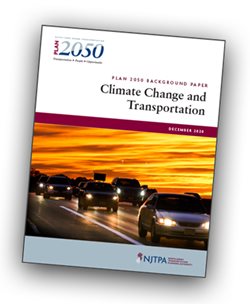 Rising sea levels and more extreme weather patterns that increase flooding are among the climate change impacts of great concern to North Jersey communities. The NJTPA’s plans and programs can help avert and address those impacts, according to Climate Change and Transportation, a new background paper issued to inform the update of the long range transportation plan, Plan 2050: Transportation, People, Opportunity.
Rising sea levels and more extreme weather patterns that increase flooding are among the climate change impacts of great concern to North Jersey communities. The NJTPA’s plans and programs can help avert and address those impacts, according to Climate Change and Transportation, a new background paper issued to inform the update of the long range transportation plan, Plan 2050: Transportation, People, Opportunity.
Annual precipitation in New Jersey is projected to increase 4 to 11 percent by 2050. Of particular concern, the paper says, is that the increase will come in the form of “more frequent, intense, and extreme rain events,” adding to the flooding in vulnerable communities along the region’s extensive coastline and waterways.
Along with broader disruptions to the economy, environment, quality of life and public heath, these impacts “create an urgent need” for the transportation sector to address climate change, the paper notes. Nationwide, transportation was the largest source of the greenhouse gas (GHG) emissions feeding climate change in 2018 at 28 percent, followed by electricity generation (27 percent) and industry (22 percent). In New Jersey, transportation’s contribution is much higher, accounting for 42 percent of total GHG emissions.
The NJTPA has supported the State of New Jersey’s legislative, regulatory and policy initiatives for addressing climate change, which are summed up in the New Jersey Department of Environmental Protection’s October 2020 Global Warming Response Act 80x50 Report.
The NJTPA’s plans and programs are also helping combat climate change effects by reducing GHG emissions and adapting infrastructure to be more resilient to flooding and other impacts. Among NJTPA contributions highlighted in the paper are:
-
Support for electrification of vehicles and the creation of vehicle charging systems, including a guidebook for communities to better accommodate electric vehicles.
-
Support for low-carbon transit and walking/biking options, and for Transit Oriented Development.
-
Oversight and modeling of air quality impacts of transportation investments, which target reducing pollutants whose emissions are tied to generation of GHGs
-
Studies to address the vulnerability of transportation infrastructure to climate change, such as the 2019 Passaic River Basin Climate Resilience Planning Study.
-
Provision of grants under the federal Congestion Mitigation and Air Quality (CMAQ) program that have been applied to electric vehicle infrastructure, diesel retrofits for vehicles and equipment, idle reduction technology, traffic signal optimization, Intelligent Transportation Systems and more.
-
Monitoring and analysis of regional progress including the updating of a regionwide GHG inventory slated for 2021.
These and other activities outlined in the paper represent the NJTPA’s commitment “to working with its partner agencies and the counties, cities and municipalities in the region to combat climate change and achieve sustainable transportation and a more sustainable environment.” These efforts will continue and be expanded under Plan 2050.